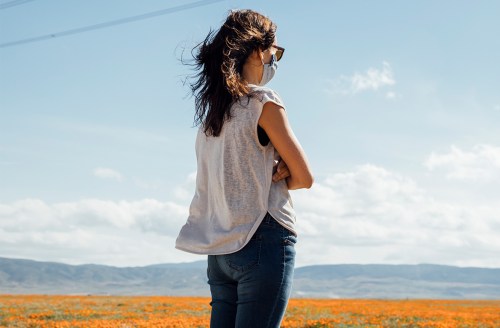Despite the COVID-19 pandemic, Kyle Zrenchik, PhD, LMFT, appears to be doing well. As a relationship and sex therapist, his business, All In Therapy, has performed strongly in the last few months. He’s in good physical shape and has not contracted the virus, and because of his status as a health-care professional, he’s even received the vaccine. As he describes, he is “thankfully weathering the storm.” But the same can’t be said for all those around him.
Experts in This Article
clinical psychologist with Columbia Health
Dr. Kyle Zrenchik, PhD is a the founder of All In Therapy.
Dr. Zrenchik has watched his patients’ lives unravel these past few months, his colleagues who worked in prisons, schools, or with the elderly have lost their jobs. He knows those who have had family members pass away and those in high-risk categories still waiting for their chance to receive a vaccine. “It does feel at times like, ‘why do I get to be so lucky?’” he says, “when I see really good, hardworking people in front of me just get dealt such bad hands, through no fault of their own.” Dr. Zrenchik says he is suffering from survivor’s guilt.
What is survivor’s guilt?
Survivor’s guilt is not a new phenomenon. The Diagnostic and Statistical Manual of Mental Disorders (DSM–5), the authoritative handbook to diagnose mental health disorders published by the American Psychiatric Association, classifies survivor’s guilt as a symptom of Post Traumatic Stress Disorder (PTSD). Symptoms often include intense feelings of guilt and shame for surviving an event that others did not. With survivor’s guilt, some suffer from flashbacks, lack of motivation, fear, nausea, sleep problems, and in intense cases, suicidal tendencies.
“Guilt is something that we experience as an emotion and relates to us having a sense of self-blame, a sense of responsibility for regretted thought or action,” Ernesto Lira de la Rosa, a clinical psychologist at Columbia Health and part of Hope for Depression Research Foundation’s Media Advisory Group, says. “When we’re thinking about survivor’s guilt, it’s that extra layer of us surviving on while others did not.”
Survivor’s guilt is often seen in first responders, veterans, holocaust victims, and those that survived natural disasters, mass shootings, or car crashes. It’s even been linked in times of economic hardship to those who still have income or a job. However, it doesn’t necessarily have to look like this, Dr. Lira de la Rosa explains. “It doesn’t have to be something where there’s a death, a natural disaster, or surviving an illness,” he explains. “It could also be just in the context of what we’re going through.” This might look like having a home or a job, or that you have recovered or never contracted the virus, or that you don’t have to go outside when you’re uncomfortable.
“We’re all living through trauma right now,” Dr. Lira de la Rosa says, and pandemic-related survivor’s guilt is not uncommon. While there is hope that the physical and economic effects of the virus will eventually subside, the long-term mental health complications need to be considered just as seriously. The Observer Research Foundation noted in May that while the extent of pandemic-related survivor’s guilt is still not fully known, the significance “must not be understated.”
How PTSD and survivor’s guilt go together (or don’t)
Erin Kaseda, a clinical psychology doctoral student at Rosalind Franklin University of Medicine and Science, along with Andrew Levine, PhD, a professor at UCLA, published an article in The Clinical Neuropsychologist Journal about the link between PTSD and COVID-19 survivors. In it, the authors argue that in the coming months and years neuropsychologists need to consider how PTSD from COVID-19 may be responsible for future cognitive complaints.
Kaseda explains that many COVID-19 survivors still experience memory difficulties and sleep problems after recovering from the virus itself. “As much as a physical change in the brain could account for some of this, the emotional impact of this genuinely very traumatic experience is also relevant, and if you don’t assess for all of it, then you can’t treat it,” Kaseda says. While not everyone who develops PTSD will also experience survivor’s guilt, there is an undeniable link between the two.
However, at the end of the paper, the authors note it is not just survivors of the virus itself who may suffer from PTSD, but also frontline healthcare workers or family members. “To be to be diagnosed with PTSD, the first criteria is that you have to have had exposure to actual or threatened death or serious injury,” Kaseda explains, “there are people who would say this general sense that any of us could get COVID-19 and die at any time qualifies as that and there are other people who would say it doesn’t.” Still, Kaseda insists the overall negative psychological impact of the pandemic is widespread.
Are we all going to have pandemic-related survivor’s guilt?
While anyone who endures the pandemic could be susceptible to survivor’s guilt to some extent, some are more at risk to develop symptoms than others. People that have previous trauma histories, individuals with anxiety or depression, and even those with high levels of emotional intelligence may be more likely to experience the weight of survivor’s guilt.
However, survivor’s guilt may look vastly different for different people, particularly those who have “identities at the intersection of each other,” Dr. Lira de la Rosa says. Especially for marginalized communities where there are already additional layers of stress in everyday, non-pandemic life due to institutionalized racism, sexism, heterosexism, and other discrimination. “It can look very different for different communities,” Dr. Lira de la Rosa explains.
“When COVID-19 struck and 30 percent of cases were [Black], I felt a deep sense of survivor’s guilt because I live a privileged life,” Maya Richard-Craven, a Los Angeles-based journalist says. The daughter of a physician and business owner, Richard-Craven grew up going on vacations and attending private school, “I didn’t experience what I deemed to be the typical African American experience.”
As the pandemic waged on, disproportionately affecting BIPOC communities, she knew she was safe and secure at her parent’s home in Pasadena and would most likely get the COVID-19 vaccine earlier than a lot of people. “That made me feel like my situation is unfair,” she says. Her family and friends are also staying healthy.“I don’t know anyone who’s passed away from COVID, and that is really rare to be African American and not somebody who’s passed away from COVID,” she says.
Her feelings of survivor’s guilt manifested as a lack of motivation, intense guilt, fear, sadness, and dependence on “unhealthy coping mechanisms.” She says talking through these feelings with her therapist has been the most effective way to combat survivor’s guilt in addition to now being completely sober.
And still, many who develop symptoms of survivor’s guilt may not ask for help, or even realize they are suffering. Because survivor’s guilt often manifests through a deep sense of shame, it can cause people to not disclose how they’re feeling. “Individuals experiencing survivor’s guilt may feel that their pain is not valid or real by comparison to others who may have not survived,” Dr. Lira de la Rosa says. This creates unique challenges for those suffering. For some, it may be hard to ask for help because the survivor’s guilt causes them to believe they do not deserve it. “It can be very isolating,” Dr. Lira de la Rosa explains, “people may not recognize it.”
What to do if you’re feeling this way
While seeking professional guidance can be a powerful first step for those who believe they may be experiencing survivor’s guilt, both Dr. Lira de la Rosa and Kaseda agree that it’s not always an accessible one. Kaseda still encourages those who can to research social workers, therapists, and licensed counselors in their area. Additionally, patients can often be referred to mental health professionals through a primary care physician.
“Seeking out social support is so important,” Dr. Lira de la Rosa says when speaking of additional methods of healing outside of medical guidance. He also encourages people to practice self-care at an emotional, physical, and spiritual level. “Making meaning of this requires that sense of awareness that these emotions and experiences are normal.”
It’s important to remember the mental health considerations that might manifest even after the pandemic ends, and how they can be confusing to understand and navigate. “I think there are going to be these longer-lasting trauma experiences that will be passed down and as a result of all these things being upended by this pandemic,” Dr. Lira de la Rosa says, making it even more important to recognize when these mental health considerations are affecting you or someone you love.
“There are these moments where we do feel gratitude [for having things others don’t] and we can also feel really sad, guilty, and shameful knowing that we were the exception to something about our situation,” Dr. Lira de la Rosa says. It’s about being able to recognize, normalize, and understand these emotions without feeling at fault for having them.
Oh hi! You look like someone who loves free workouts, discounts for cult-fave wellness brands, and exclusive Well+Good content. Sign up for Well+, our online community of wellness insiders, and unlock your rewards instantly.
Sign Up for Our Daily Newsletter
Get all the latest in wellness, trends, food, fitness, beauty, and more delivered right to your inbox.
Got it, you've been added to our email list.











